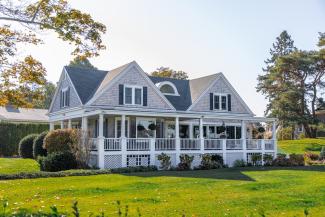
What's Going On in the Real Estate Market?
During the pandemic, the real estate market changed drastically. Home prices in particular increased drastically, but the quick increase in interest rates in 2022 have led to yet more shifts in the market. As financial advisors, we often hear from individuals looking to buy and/or sell homes, property for their businesses, and even farmland. We decided to speak with some local experts to determine what’s going on with the real estate market now, and what they see for the near future.
Please note that this article, and the included answers, are intended as general observations and not personalized advice. To determine the best course of action for your particular situation, please consult with a realtor, your financial advisor, and/or your tax advisor. We can work as a team to recommend a course of action specific to you.
Residential Real Estate
Over the past few years, home prices increased dramatically - fueled both by low interest rates, and a desire to have more space while families were staying home and working from home. Homes started receiving many offers, some over list price, and would sometimes sell within a day of hitting the market. This rapid increase in home values is a partial contributor to the higher rate of inflation we’ve seen over the past year.
To combat this inflation, the Federal Reserve has started raising interest rates aggressively. The average 30-year fixed mortgage rate, which was under 3% in 2020, now stands around 6%. This has led to a slow-down, but not a decline in home prices.
Where do you see mortgage rates going this year, and how will that affect the housing market?
“Mortgage rates will continue to rise this year. Right now these rates are closely connected to what the government does to combat inflation. The more measures put in place to counteract inflation; the higher rates will likely be. At the beginning of the year, rates rose quickly. They then stabilized for a couple months and are rising once again. We expect the market to slow down and are already seeing it start to slow. However, this will not be like the 2008 housing crisis. That was a historical event caused by many factors other than a recession. We anticipate that Low inventory will continue to keep prices high and homes will still sell, though we will not be seeing as many multiple offers. In essence, over the next year or so we expect the market to correct to a state similar to 2018 or 2019 albeit with the increased prices of the last few years.”
- Sold on Toni Team, www.soldontoni.com
Do you see the housing market slowing down or values dropping as interest rates increase?
“I have not seen any value drops, and in fact most experts are predicting a 10-15% increase in value over the next year due to inflation and low inventory. Cost of lumber and other building materials, as well as the wait time to get materials and contractors, have discouraged those who may have planned to build a new home. Instead, they are buying existing construction – and without new construction, inventory will remain low. This scarcity means that homes are still moving quickly, and we are still seeing bidding wars – we aren’t seeing as many offers as we did last year, but buyer demand is still there.”
- Rebecca Hazzard, www.northernillinoisproperties.com
How would the market change if there is a recession in the next few years?
“If there is a recession, it may become more challenging to sell your home. However, history indicates that real estate is one of the most recession proof investments that one can make. Buying and holding on to properties during a recession period should yield a great deal of equity for those who are in a position to do so."
- Rebecca Hazzard, www.northernillinoisproperties.com
“How a recession would affect the local real estate market depends on how long the recession lasts. The longer it lasts, the slower homes sell, and the lower the values. If that happened, we would shift to more of a buyer’s market despite higher interest rates.”
- Sold on Toni Team, www.soldontoni.com
For buyers financing a substantial amount of the value, how much should they target as a down payment?
“This just depends on someone’s personal situation - when rates were lower, clients liked to hang on to that cash because they already had a smaller monthly payment that anticipated. Now, with higher interest rates, it may make more sense to put more money down to keep the payment lower. You also have to think about having cash reserves for any other issues that may arise in life or with your property. Were you planning any remodels, or any other significant expenses after the move?”
- Rebecca Hazzard, www.northernillinoisproperties.com
"The amount a buyer should finance is a tricky question and the answer depends entirely on the individual buyer’s situation so you should reach out to your financial advisor and a local lender to determine what is best for you. A conventional loan will allow as little as 3% down payment. However, you will need to pay for Private Mortgage Insurance monthly if your down payment is less than 20%. If you need to put down less than 20%, then how much you should put down depends on what you intend to use the extra money for. As real estate agents, we finance many of our investment properties when rates are low. That frees up cash to invest in other ways. As long as that investment is making more money for you than you are paying in your interest rate, it’s a good decision. Also remember, especially for first time homebuyers, you don’t want to spend your emergency fund on your down payment.
You should always talk with your financial advisor and a local lender about how much is right for you to use as a down payment. We do stress that local lenders are going to be the best asset for you. The buying process is far easier and often less expensive for the buyer than it is with a national company. For instance, not only are closing costs lower, but in multiple offer situations, it is very common for sellers to choose an offer with a local lender even if another offer is higher. The local lenders we work with will care more about finding the right solution for you than making the most money themselves.”
- Sold on Toni Team, www.soldontoni.com
Any advice for those who want to move but don’t want to sell their home until they have found a new one?
“Wanting to wait to list your home until you have found a new one is common, especially in a market where it is tougher to be a buyer than a seller. However, right now it is close to impossible to get an offer accepted on a home if you have a home sale contingency and your home is not yet listed. So, do your best to remove the contingency. Then you can take your time finding the right house without the worry of meeting a deadline. There are multiple strategies to eliminate a contingency that we’d be happy to discuss.”
- Sold on Toni Team, www.soldontoni.com
What differences do you see in the local housing market compared to the national market?
“Way less inventory means even less opportunity for clients trying to get into smaller, rural communities. Right now in Oregon (IL) there are 13 homes for sale. In the entire town of Oregon!”
- Rebecca Hazzard, www.northernillinoisproperties.com
“Some areas are still experiencing crazy appreciation and others are already seeing a significant shift in the market. We are between those two extremes and are currently experiencing the beginnings of a shift. We are seeing home values appreciating at a rate much slower than last year and homes are staying on the market for a little bit longer. But, we are also still seeing multiple offers and homes selling over list price. If you have been considering selling, now is the time to do it.”
- Sold on Toni Team, www.soldontoni.com
Commercial Real Estate (Jonathan R. Krause, CRB, Gambino Realtors www.gogambino.com)
How has the local commercial real estate market compared to the residential market over the past few years?
"The driving forces behind residential vs. commercial real estate sales are quite different. As you know, residential sales have been very strong over the last few years. Commercial real estate is driven by need, and while sales and leasing are still occurring, it is just not as strong as residential sales.”
Do you expect to see demand increase, decrease, or stay level in the coming years?
“The answer to that question is tied directly to the economy. Our region has many advantages related to location and accessibility to transportation, work force, and relatively reasonable property values. On the other hand, the new work-from-home capabilities is reducing the need for office space. Likewise, shopping online on Amazon and other places is diminishing the foot traffic in shopping centers and box stores. We are seeing existing buildings being re-purposed for other needs. Our region is always in competition with other communities to attract and retain businesses. I anticipate the commercial sector in our area to grow slowly over the next few years.”
What advice do you have for business owners who are considering buying property instead of renting?
“The first piece of advice is to consult with your financial advisors and accountant to determine whether owning personally or corporately makes sense. I have assisted several business owners to buy commercial properties in their own name, and then have the company lease back from them. In a couple of cases, they purchased a building larger than they needed, and were able to enjoy additional rental income, while at the same time having the ability to expand their space down the road if needed. Depending on the circumstances, having your company as your tenant could augment retirement income if the business were sold.”
What factors should a business owner consider when looking at a potential building/office?
“There are so many variables to this question. Some businesses would benefit from a high-visibility location with signage. For others, it doesn’t really matter. I highly recommend a thorough inspection period to be crafted within the terms of the purchase contract. Each specialty should be brought in to ascertain the structural and mechanical condition of the building. Confirmation from the local zoning authority should be required to make sure that your intended use is acceptable. In some cases, an EPA Phase 1 site investigation is prudent to make sure there are no underground contamination issues.”
Any advice given the recent increase in interest rates?
“While rates are indeed going up, they are still far more attractive than they were years ago. Likewise, the concept of refinancing at a lower interest rate is now quite prevalent, so there is no reason sit wait for potentially lower rates in the future. Higher interest rates do increase the cost of ownership, but they are also tax-deductible, and the higher payments eventually are factored into what someone might be willing to pay for a building or charge for rent.”
- Jonathan R. Krause, CRB, Gambino Realtors www.gogambino.com
For Our Farmers (Ron Pifkin Realty, www.ronpifkinrealty.com)
How has the value of farmland grown in the recent past?
“The value of farmland, especially Grade A, has been on an upward trend. Over the past 20 years, the value of some farmland has as much as tripled. This is, in part, due to increased productivity from better equipment. Demand has increased from farming families, who may pay above market price to acquire farmland close to their existing fields. If they are investing in new technology and equipment, it makes sense for them to try to spread these costs over greater areas. There has also been a resurgence of investors purchasing farmland, which affects demand and the prices.”
How should families think about keeping or selling farmland, if the next generation doesn’t actively farm?
“With the increase in values, farmers may be subject to taxes (capital gains and/or estate taxes) if they sell the land. With current stepped-up basis laws (where the cost basis for capital gains purposes is “stepped-up” to the value at the previous owner’s death), it likely makes sense for retiring farmers to rent the land rather than sell it outright. An exception to this would be if there are disputes within the family that they wish to settle.
However, the rent prices have not increased in proportion with the land values. In the past, an owner may have gotten 5-6% of the land value back in annual rents – now, that rate is roughly 3-4%. So for children who inherit land and don’t wish to farm it, they may choose to sell and invest the money elsewhere.”
What other advice to you have for farmers given the increased value of farmland?
“Proper tax and estate planning can be essential for farmers and their families. With increased prices, farmers may not realize that their farmland may create an estate tax obligation upon their death – which may force the children to sell at least some of the land. Additionally, families don’t always agree on what to do when inheriting farmland. Parents can settle some of these disputes ahead of time with good planning.”
- Ron Pifkin Realty, www.ronpifkinrealty.com





